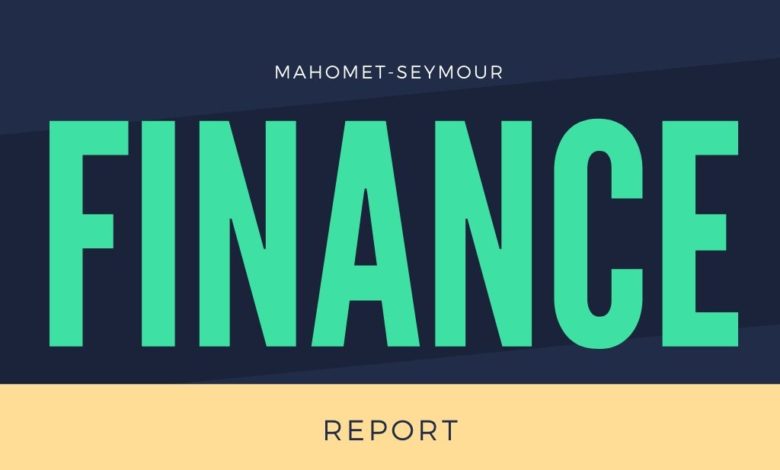Mahomet-Seymour falls to lowest ISBE Financial Profile Category

Mahomet-Seymour has been placed in the lowest financial profile, “financial watch,” by the Illinois State Board of Education.
The Mahomet-Seymour School Board was made aware of the preliminary financial rating at the end of February when former Chief Business Officer Trent Nuxoll argued that the district should be in the “early warning” category, where Mahomet-Seymour has been for two years.
For the last 17 years, ISBE has reviewed each district’s financial profile based on fund balance to revenue ratio, expenditure to revenue ratio, days of cash on hand and percent of short-term and long-term borrowing ability remaining.
The State then gives each district a score and places them in the financial recognition (highest), review, early warning or watch (lowest) category.
In 2019, there were 12 school districts in the “watch” category. This year, after adjusted scores, there are 8 school districts at the lowest level; this is the fewest number of districts in the watch category in the history of the report.
The 2020 Financial Profile also realized the largest number of districts in the highest “Financial Recognition” category with 706 of the 851 districts that reported.
The 212 page report cites an increase of state funding from the Evidence-based Funding model, increased EAVs, and lesser reliance on debt.
After reviewing Nuxoll’s argument that Mahomet-Seymour should receive a higher score than 2.55 because Champaign County delayed property tax payments, ISBE stuck with the 2.55 score.
A Tier 2-funded school, Mahomet-Seymour received $509,000 more in FY 2019 from the Evidence-based funding model than it did in FY 2018.
Mahomet-Seymour has continued to see a declining score in the fund balance to revenue ratio and days of cash on hand categories since 2015. According to the ISBE report, the total FY 2019 revenue of the Mahomet-Seymour School District was $23,220,749 with a fund balance of $2,988,451. The report also showed that Mahomet-Seymour operated with 40 days of cash on hand in FY 2019, whereas the state suggests at least 180 days of cash on hand.
Mahomet-Seymour also received a low score of expenditure to revenue ratio, whereas the total revenues were $23,220,749 in FY 2019 and the total expenditure was $26,650,322.
With $34,432,715 in long-term debt, the Mahomet-Seymour School District only has 35.32-percent of the debt margin remaining. It still has 100-percent of the short-term debt borrowing capacity remaining, according to the report.
The Mahomet-Seymour CUSD #3 School District is the only district that is in the “watch” category in Champaign County.
On Monday, during a discussion on finances during a special Mahomet-Seymour board meeting, Board President Max McComb justified where the district is financially.
“We spent balances down below what the state recommends,” McComb said. “We’ve always been comfortable with our balances and we feel like we are good there, and we felt that was the best thing to do for our community; certainly the community seemed to agree with that at the time and I think they still do.”
The Mahomet-Seymour School Board recently authorized an additional $960,00 in additional debt to renovate the fieldhouse and high school administration offices.
Locally, Heritage CUSD (Community Unit School District) #8 remained “recognition” category, as did Ludlow, Gifford, Champaign CUSD #4, Prairieview CCSD #197, Rantoul Township #193, St. Joseph CHSD (Consolidated High School District) #305, Thomasboro CCSD #130.
The 2020 report showed that Rantoul City Schools #137, Fisher, Tolono CUSD #7 were placed in the “review” category while St. Joseph CCSD #169 and Urbana are in the “early warning” category.
Districts in the early warning and watch category are monitored to see if they need assistance from ISBE.




